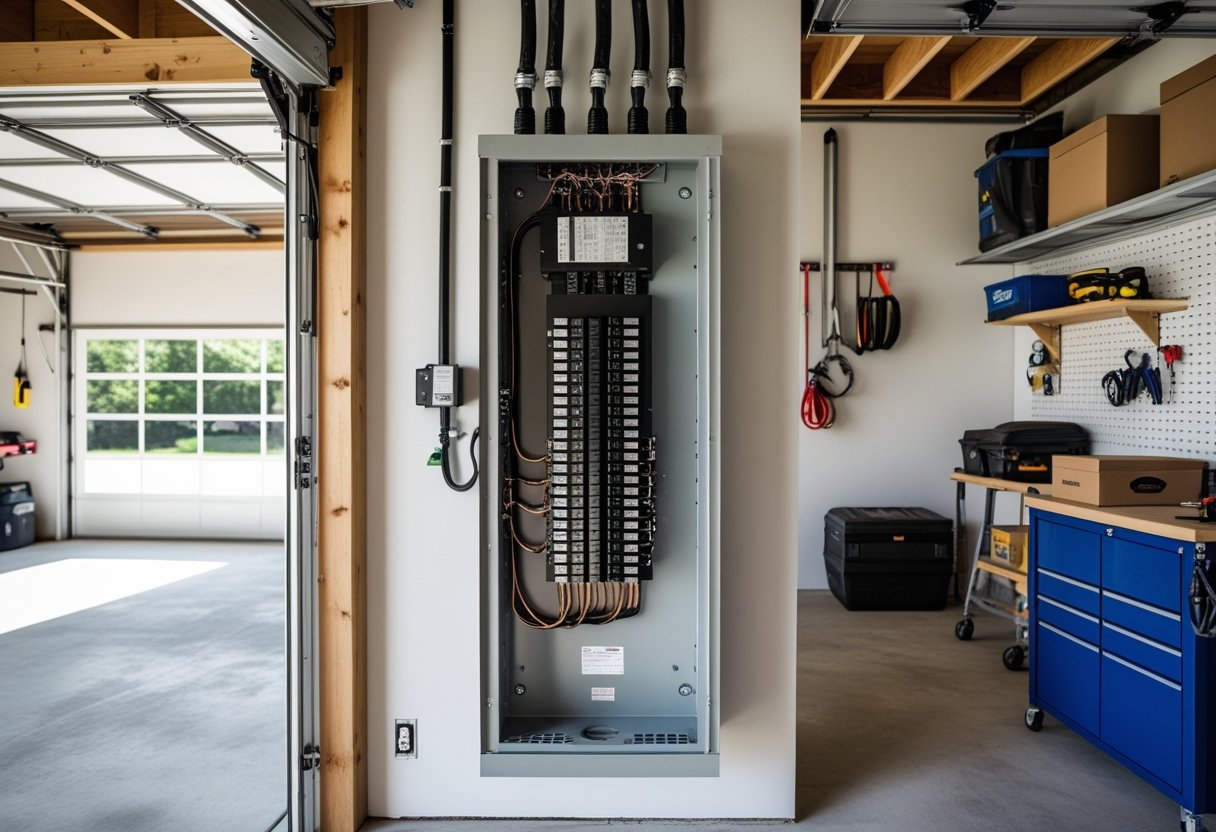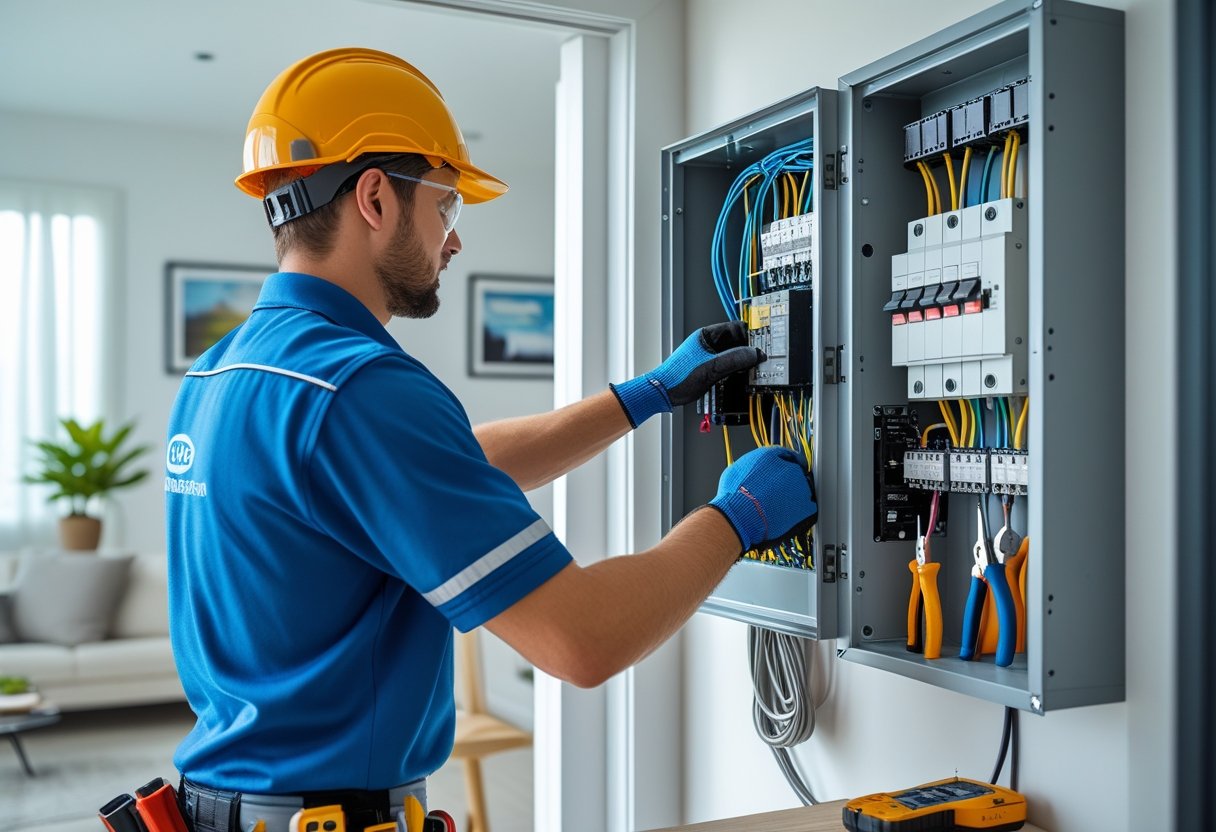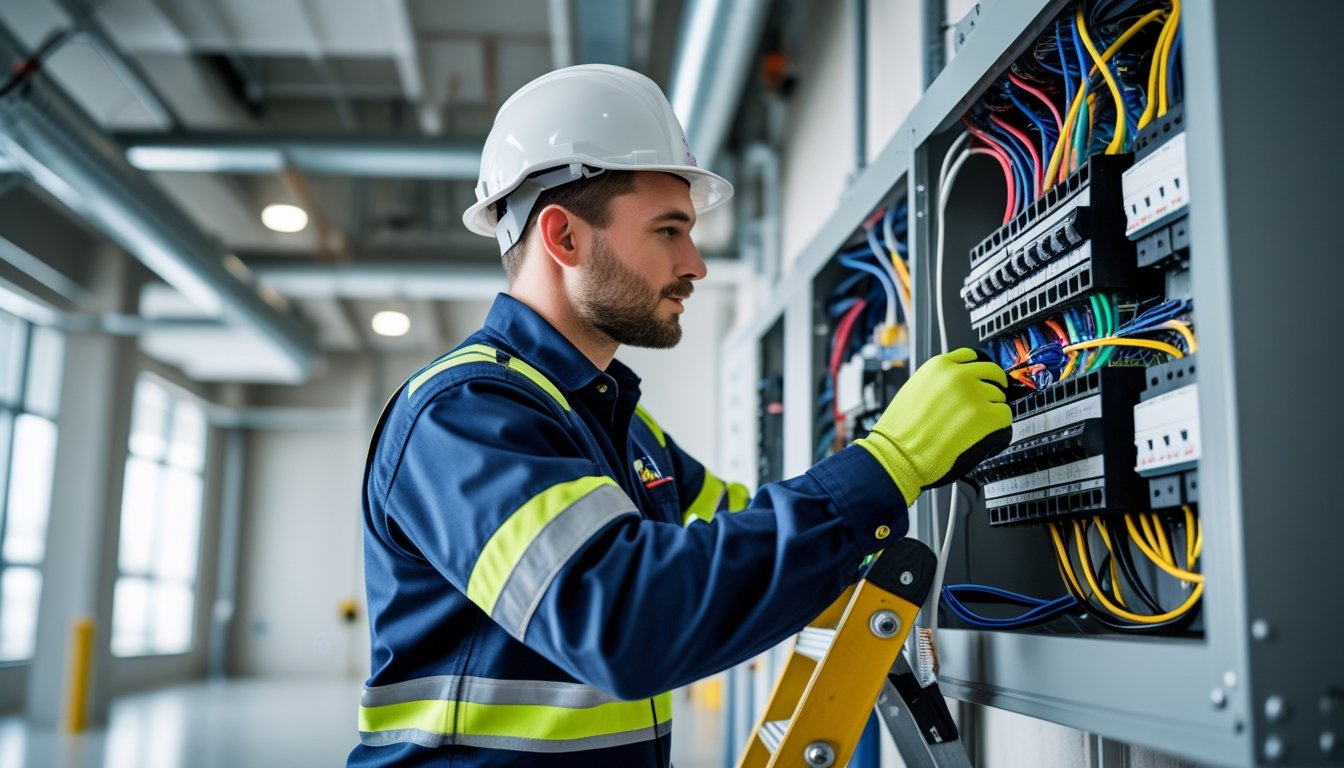As the popularity of electric vehicles (EVs) continues to rise, understanding how to charge them becomes increasingly important. An EV charger is a device that supplies electrical energy to recharge the batteries of electric vehicles, ensuring they are ready for your next drive. These chargers come in various forms, each suited for different charging speeds and home or public use.
When considering the installation of an EV charger at your home, it is beneficial to rely on professionals. AAA Electrical Services offers expert EV charger installation to ensure safe and efficient charging, catering to the needs of your family while integrating seamlessly into your home. By choosing a tailored solution, you enhance the convenience and efficiency of owning an electric vehicle.
Incorporating charging stations into your daily routine not only supports sustainable transportation but also adds value to your property. With a reliable installation from AAA Electrical Services, you can charge your vehicle at your convenience and contribute to a greener future.
What Is an EV Charger?
An EV charger is a crucial component of electric vehicle ownership, facilitating the transfer of electrical energy to charge the vehicle's battery. Understanding its definition, function, and types will help you make informed decisions for your electric vehicle charging needs.
Definition and Core Function
An EV charger, or electric vehicle charger, is a device that delivers electric power to an electric vehicle (EV) for recharging its battery. It connects to a power source, pulling electricity and converting it as needed for the vehicle's battery system. Unlike conventional automotive fuels, charging times can vary based on the charger type, battery capacity, and state of charge.
For electric vehicle owners, having a reliable charging solution at home or nearby is essential for maintaining your vehicle’s performance and range. This not only enhances convenience but also contributes to the overall sustainability of your transportation.
How EV Chargers Work
EV chargers function by transferring electricity from a power source directly to a vehicle's battery. When connected, the charger communicates with the vehicle's onboard charging system to control the flow of electricity and ensure safe operation.
They are typically powered by either a standard household outlet or a dedicated electrical circuit. The process involves the following steps:
- Connection: You plug the charger into your vehicle's charging port.
- Power Delivery: The charger supplies electrical current, either alternating current (AC) or direct current (DC), depending on the charger type.
- Battery Management: The vehicle’s system regulates the charging rate to prevent overheating or damage, ensuring safe and efficient charging.
For reliable installation and assistance, you can reach out to AAA Electrical Services, where we focus on your family’s safety.
Types of EV Chargers
EV chargers are categorized into three main types, each designed for different charging speeds and applications:
- Level 1 Chargers:
- Utilizes a standard 120V outlet.
- Slowest charging speed (typically 4–5 miles of range per hour).
- Ideal for overnight charging at home.
- Level 2 Chargers:
- Operates on 240V power, similar to household appliances like dryers.
- Offers faster charging (about 25 miles of range per hour).
- Suitable for home installations and public charging stations.
- DC Fast Chargers:
- Provides high-voltage direct current for rapid charging.
- Can recharge an EV to 80% in around 30 minutes.
- Commonly found at highway rest stops and commercial charging stations.
Having an understanding of these charger types will help you choose the best fit for your lifestyle. For tailored assistance, consider consulting with AAA Electrical Services, which specializes in EV charger installation to meet your specific needs.
Charging at Home
Charging your electric vehicle at home is a convenient and efficient way to ensure that your vehicle is ready when you need it. Understanding the installation process, the types of charging equipment available, and the importance of using a licensed electrician are key to optimizing your home charging experience.
Home EV Charger Installation
Installing a home EV charger involves choosing the right location and ensuring that your electrical system can handle the load. Most installations require a Level 2 charger, which can significantly reduce charging time compared to a standard outlet. As a homeowner, you may need to upgrade your electrical panel if it doesn't meet the charging demands.
Additionally, the installation process should comply with local codes and regulations. Expert services, like those provided by AAA Electrical Services, ensure a safe and efficient installation. This guarantees that your charger operates properly and that your home’s electrical system remains secure.
Charging Equipment Choices
When selecting charging equipment, you have several options. Level 1 chargers plug into standard household outlets and are slower, often taking a full day to fully charge your vehicle. Level 2 chargers require dedicated circuits and can charge an EV in just a few hours.
Investing in a good home charger typically ranges from $350 to $750. Features such as smart technology, which allows remote monitoring and control via smartphone apps, can enhance usability and efficiency. Be sure to consider the specifications of your vehicle when making a selection, as this can influence charging speed and compatibility.
Role of a Licensed Electrician
Hiring a licensed electrician for your home EV charger installation is crucial for safety and compliance. Professionals like those at AAA Electrical Services bring over 42 years of expertise to ensure that every aspect of your installation meets safety standards.
A licensed electrician will assess your home’s electrical system, handle necessary upgrades, and ensure proper installation. This not only prevents costly mistakes but also safeguards your family and property. Relying on certified professionals helps to ensure that your charger operates effectively and lasts longer, providing peace of mind for your home charging needs.
Charging Stations and Public Charging
Understanding the key aspects of charging stations and public charging can enhance your experience with electric vehicles. These facilities play a crucial role in ensuring you have access to power when needed, whether at home, work, or on the go.
Public Charging Infrastructure
Public charging infrastructure has expanded rapidly in recent years, making it easier for you to charge your electric vehicle (EV) wherever you go. These charging stations are strategically located in urban areas, highways, shopping centers, and parking lots, providing convenient access.
Many public chargers are either free or available for a fee, typically based on the amount of electricity used. Options may vary between Level 2 chargers, which take a few hours to charge an EV, and DC fast chargers that can significantly reduce charging time to around 30 minutes. The integration of this infrastructure is crucial for your everyday use, allowing longer trips with more confidence.
Workplace Charging
Workplace charging programs are gaining popularity as companies recognize the benefits of supporting EV adoption. These installations offer employees the convenience of charging during work hours, ensuring you start each day with a full battery.
Employers may provide free charging or charge a nominal fee, which can influence your decision to drive an electric vehicle. Having these facilities at work not only enhances your experience but also demonstrates a commitment to sustainable practices.
Additionally, AAA Electrical Services specializes in workplace charging installations to help local businesses in the Sacramento area provide this essential service.
Types of Charging Stations
You will encounter various types of charging stations when looking to recharge your EV:
- Level 1 Chargers: These use a standard 120-volt outlet, best for home use, and take longer to charge.
- Level 2 Chargers: Common in public charging stations, these require a 240-volt source and are faster than Level 1.
- DC Fast Chargers: Ideal for quick charging, these are mainly found at highway rest areas and can significantly reduce waiting time.
Each type serves different needs, making it essential for you to choose the right charger based on your usage patterns. Regardless of your choice, efficient charging stations enable you to seamlessly integrate EVs into your daily life.
Charging Speeds and Levels
Electric vehicle (EV) charging involves various speeds and levels, which are crucial to understanding how quickly you can recharge your vehicle. The following subsections explore the specifics of Level 2 chargers, charging speeds, faster technologies, and important battery considerations.
Level 2 Chargers Explained
Level 2 chargers are widely used for home and public charging stations. These chargers provide a power output of 240 volts and typically deliver between 3.3 kW to 19.2 kW of power. With this capability, a Level 2 charger can recharge a battery electric vehicle (BEV) to around 80% capacity in about 4 to 10 hours.
For plug-in hybrid electric vehicles (PHEVs), charging time reduces significantly, often taking just 1 to 2 hours for a full charge. Installing Level 2 charging stations at your home can maximize convenience and ensure your vehicle is ready when you need it. Companies like AAA Electrical Services specialize in installing these chargers, ensuring a safe and efficient setup.
Understanding Charging Speeds
Charging speeds vary significantly based on the type of charger and battery capacity. The charging speed for Level 1 chargers, typically 120 volts, is much slower, requiring up to 24 hours for a full recharge of most EVs. This makes Level 2 chargers the preferred choice for daily use.
Charging times are also influenced by the vehicle's onboard charger and battery management system. Most Battery Electric Vehicles (BEVs) can accept fast charging, while PHEVs may have lower acceptance rates. Knowing these specifications allows you to make informed choices about the charger you need for your lifestyle.
Faster Charging Technologies
Faster charging technologies include Direct Current Fast Charging (DCFC), also known as Level 3 charging. These chargers can provide up to 350 kW of power, enabling you to charge a standard electric vehicle in as little as 20 minutes, depending on the battery's acceptance rate.
DCFC stations are strategically placed along highways and in urban areas to facilitate long-distance travel. While they are not necessary for most daily charging needs, their existence offers valuable convenience for road trips or during long wait times between errands.
Battery Charge Considerations
When using any charging station, consider the vehicle’s battery type and capacity. Not all vehicles respond the same way to rapid charging. Overcharging can lead to battery degradation over time, which is why staying within recommended charging practices is essential.
To maintain battery health, manufacturers provide guidelines on optimal charging levels. It’s crucial to avoid charging to 100% unless necessary and to keep the battery's charge between 20% and 80% whenever possible. AAA Electrical Services can provide insights into the best practices for maintaining battery life and functionality.
Environmental Impact and Future Considerations
The environmental impact of electric vehicle (EV) chargers is significant, reflecting both challenges and opportunities. As the adoption of EVs increases, understanding the implications of charging infrastructure becomes essential, particularly in terms of carbon emissions and future advancements.
Reducing Carbon Emissions
EV chargers play a crucial role in reducing carbon emissions, especially when connected to renewable energy sources. Powering charging stations with clean electricity can significantly lower the greenhouse gases emitted during vehicle operation. According to the U.S. Department of Energy, the life cycle carbon emissions can be greatly reduced by selecting charging times when the grid operates on low-emission energy.
Utilizing tools for energy management can optimize charging schedules to align with the availability of renewable resources, fostering a cleaner environment. By prioritizing energy-efficient chargers, you can contribute to a reduction in both your carbon footprint and the overarching environmental impact.
Government Support and Initiatives
Government support plays a pivotal role in promoting the adoption of EV chargers. Federal and state initiatives, including tax credits and grants, are aimed at expanding charging infrastructure. Programs from the U.S. Department of Energy emphasize the importance of accessibility and convenience in charging options, making it easier for you to switch to electric vehicles.
Such initiatives can also enhance the local economy by creating jobs in installation and maintenance. By investing in EV charging stations, communities can ensure sustainable growth while reducing environmental harm. This strategy supports businesses focused on electrical services like AAA Electrical Services, which are committed to modern, clean technology installations.
Trends in Charging Options
Charging options are rapidly evolving, influenced by demand for sustainability and efficiency. Fast chargers are becoming more common, allowing you to recharge EVs in a matter of minutes rather than hours. Wireless charging technology, still in development, aims to provide convenience while minimizing physical infrastructure.
Additionally, smart charging solutions are emerging, allowing for better energy management and integration with home solar panels. These innovations not only enhance your charging experience but also contribute to the overall reduction of carbon emissions. By staying informed about these trends, you can make more informed decisions that align with your values and needs in sustainable transportation.
Frequently Asked Questions
Understanding electric vehicle (EV) chargers involves knowing how they operate, the installation requirements, and the financial aspects of using them. Here are some common questions and their answers to help you navigate the world of EV charging.
How does an EV charger work?
An EV charger takes alternating current (AC) from a power source and converts it into direct current (DC) to charge the vehicle's battery. The charger communicates with the vehicle through a connector, ensuring safe and efficient charging. Different chargers offer varying speeds and power levels.
What are the requirements for installing an electric vehicle charging station?
To install an EV charging station, you need a dedicated electrical circuit, which may require a panel upgrade if your current electrical system can't handle the additional load. Your installation site should have good access to a power supply, with considerations for local codes and permits. Consulting a licensed electrician, such as AAA Electrical Services, can ensure compliance and safety.
How do EV charging stations calculate charging fees for customers?
Charging fees can vary based on location, the type of charger used, and the duration of the charge. Some stations charge per kilowatt-hour (kWh), while others may have a flat rate or charge by time. It's essential to understand the pricing structure before charging.
What are the basic things I need to know about EV charging?
Understanding your vehicle's range, the types of charging connectors it uses, and the various charging speeds can enhance your charging experience. Charging at home provides convenience, while public stations can offer fast charging options. Familiarize yourself with available charging networks and apps for easy access.
Can an EV charger be installed at a residential property?
Yes, an EV charger can be installed at a residential property, making it convenient for daily charging. Home installations typically require a wall-mounted charger connected to your electrical system. Hiring a professional, like AAA Electrical Services, ensures a safe and efficient installation tailored to your home.
What are the specifications one should look for in an EV charger?
When selecting an EV charger, consider factors like charging speed (measured in kilowatts), compatibility with your vehicle's charging port, and smart features like Wi-Fi or app connectivity. It's also vital to ensure the charger meets safety standards and has a warranty for added peace of mind.





